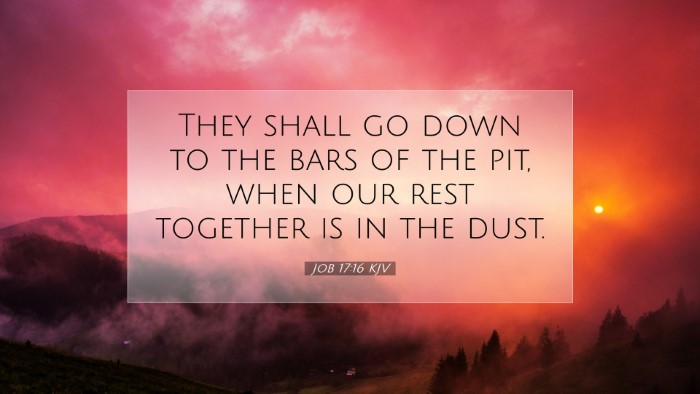Old Testament
Genesis Exodus Leviticus Numbers Deuteronomy Joshua Judges Ruth 1 Samuel 2 Samuel 1 Kings 2 Kings 1 Chronicles 2 Chronicles Ezra Nehemiah Esther Job Psalms Proverbs Ecclesiastes Song of Solomon Isaiah Jeremiah Lamentations Ezekiel Daniel Hosea Joel Amos Obadiah Jonah Micah Nahum Habakkuk Zephaniah Haggai Zechariah MalachiJob 17:16
Job 17:16 KJV
They shall go down to the bars of the pit, when our rest together is in the dust.
Job 17:16 Bible Commentary
Commentary on Job 17:16
Verse Overview: Job 17:16 states, "Where now is my hope? Who can see any hope for me?" This verse encapsulates the desperate plight of Job, a man who has endured incredible suffering and loss. His questioning highlights a deep existential crisis that reverberates throughout the text, as he grapples not only with physical agony but also with the sense of abandoned hope.
Insights from Public Domain Commentaries
Matthew Henry's Commentary
Matthew Henry emphasizes the emotional turmoil Job faces in this verse. He points out that Job, having lost his wealth, his health, and his children, feels as if he has been stripped of all sources of comfort. In his hopelessness, he articulates the abandonment of any tangible hope for the future. Henry notes that Job's words reflect a common human experience: the feeling of despair when all seems lost.
- Despair and Reflection: Henry suggests that Job's lament invites readers to reflect on their own lives when hope seems unattainable.
- The Nature of Hope: He mentions that hope is intrinsically tied to one's circumstances but transcends them when anchored in God's promises.
Albert Barnes' Notes on the Bible
Albert Barnes offers a theological perspective on this verse, connecting Job's words to the nature of hope in the context of suffering. He asserts that Job's despair arises not just from his predicament but also from a perceived alienation from God. Barnes stresses that Job's hope is tied to his understanding of God’s justice and mercy, implying that without a clear communication or interaction with God, hope becomes elusive.
- Theological Implications: Barnes reflects on how Job's questioning of hope challenges the believer to maintain faith even in darkness.
- Hope in Resurrection: He hints at a theological underpinning of resurrection and eternal life, suggesting that genuine hope extends beyond the physical realm.
Adam Clarke's Commentary
Adam Clarke provides a more exegetical analysis, focusing on the Hebrew text of Job 17:16. He discusses the original language, indicating that the phrasing reveals Job's deep sense of isolation. Clarke notes that Job is not just questioning hope; he is expressing a profound confrontation with the silence of God amid his suffering.
- Isolation and Desperation: Clarke observes that Job's existential crisis illustrates the struggle of the faithful when they feel abandoned by God.
- Universal Human Condition: He posits that Job’s question is a universal one, reverberating through the ages as people seek meaning and reassurance in their trials.
Pastoral Applications
This verse and its commentaries provide substantial material for pastoral care. Understanding Job’s despair can enhance the empathy pastors extend to congregants facing hopeless situations. The reflections on hope can guide pastoral counseling, emphasizing that while physical circumstances may define a moment, God's eternal nature offers solace and assurance beyond present afflictions.
- Comfort in Crisis: Pastors can draw on Job’s experience to help congregants articulate their pain while guiding them toward a deeper understanding of hope in God.
- Encouraging Resilience: Teaching through Job can encourage resilience in faith, urging believers to seek God’s voice in their suffering.
Conclusion
Job 17:16 serves as a poignant reminder of the depths of human despair and the quest for hope. The commentaries by Matthew Henry, Albert Barnes, and Adam Clarke provide layers of understanding that enrich our comprehension of this verse. They remind pastors, students, and theologians that hope is a complex emotion intertwined with faith and circumstances, yet anchored in the eternal nature of God’s promise.


